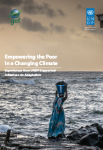A report by the UN Development Programme (UNDP), co-sponsored by the Global Environment Facility (GEF), on ‘Empowering the Poor in Changing Climate,' addresses the positive link between poverty reduction and climate change adaptation.
With case studies from around the world, the report looks at how countries are using GEF resources to reduce the vulnerability of poor communities that have higher exposure to climate risk.
 17 October 2015: A report by the UN Development Programme (UNDP), co-sponsored by the Global Environment Facility (GEF), on ‘Empowering the Poor in Changing Climate,’ addresses the positive link between poverty reduction and climate change adaptation. With case studies from around the world, the report looks at how countries are using GEF resources to reduce the vulnerability of poor communities that have higher exposure to climate risk.
17 October 2015: A report by the UN Development Programme (UNDP), co-sponsored by the Global Environment Facility (GEF), on ‘Empowering the Poor in Changing Climate,’ addresses the positive link between poverty reduction and climate change adaptation. With case studies from around the world, the report looks at how countries are using GEF resources to reduce the vulnerability of poor communities that have higher exposure to climate risk.
The report focuses on four main themes: Capacity building; Supporting climate-resilient livelihoods; Stimulating entrepreneurship; and Mainstreaming adaptation into development policies.
On capacity-building, the report discusses creating platforms for multi-stakeholder engagement and developing new methodologies for data collection, information management and decision making. In Ghana, for example, a financing initiative enabled the creation of climate-risk data maps; the report also highlights successful capacity building programmes in Honduras and Samoa.
On supporting climate-resilient livelihoods, the report focuses on securing livelihoods for vulnerable households, including by increasing the resilience of subsistence agriculture. Policies implemented in Bangladesh, Sudan, Nicaragua and Namibia show the importance of risk reduction in all kinds of environments, the report highlights.
Private entrepreneurship in vulnerable communities is seen as vital for supporting pro-poor investment. Cases in Tajikistan, Colombia and Niger show that both increasing resilience and finding alternative livelihoods through locally developed private initiatives can be sustainable while also promoting gender equality, and are an efficient target for increased development assistance.
Finally, adapting development policies to tackle poverty and climate change in tandem is paramount, according to the report. In most of the target countries, such as Mali and Cambodia, agriculture is both vital for poverty reduction and vulnerable to climate change. As a result, tetter designed development plans and more informed decision-making at the local level have had positive effects on the ground. [Publication: Empowering the Poor in a Changing Climate: Experiences from UNDP Supported Initiatives on Adaptation]